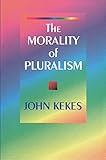The Morality of Pluralism / John Kekes.
Material type: TextPublisher: Princeton, NJ : Princeton University Press, [1996]Copyright date: ©1993Edition: Core TextbookDescription: 1 online resource (238 p.)Content type:
TextPublisher: Princeton, NJ : Princeton University Press, [1996]Copyright date: ©1993Edition: Core TextbookDescription: 1 online resource (238 p.)Content type: - 9780691044743
- 9781400821105
- 171.7
- BJ1031 .K24 1993
- online - DeGruyter
- Issued also in print.
| Item type | Current library | Call number | URL | Status | Notes | Barcode | |
|---|---|---|---|---|---|---|---|
 eBook
eBook
|
Biblioteca "Angelicum" Pont. Univ. S.Tommaso d'Aquino Nuvola online | online - DeGruyter (Browse shelf(Opens below)) | Online access | Not for loan (Accesso limitato) | Accesso per gli utenti autorizzati / Access for authorized users | (dgr)9781400821105 |
Frontmatter -- Contents -- Acknowledgments -- CHAPTER ONE. Introduction: Setting the Stage -- CHAPTER TWO. The Six Theses of Pluralism -- CHAPTER THREE. The Plurality and Conditionality of Values -- CHAPTER FOUR. The Unavoidability of Conflicts -- CHAPTER FIVE. The Nature of Reasonable Conflict-Resolution -- CHAPTER SIX. The Possibilities of Life -- CHAPTER SEVEN. The Need for Limits -- CHAPTER EIGHT. The Prospects of Moral Progress -- CHAPTER NINE. Some Moral Implications of Pluralism: On There Being Some Limits Even to Morality -- CHAPTER TEN. Some Personal Implications of Pluralism: Innocence Lost and Regained -- CHAPTER ELEVEN. Some Political Implications of Pluralism: The Conflict with Liberalism -- Works Cited -- Index
restricted access online access with authorization star
http://purl.org/coar/access_right/c_16ec
Controversies about abortion, the environment, pornography, AIDS, and similar issues naturally lead to the question of whether there are any values that can be ultimately justified, or whether values are simply conventional. John Kekes argues that the present moral and political uncertainties are due to a deep change in our society from a dogmatic to a pluralistic view of values. Dogmatism is committed to there being only one justifiable system of values. Pluralism recognizes many such systems, and yet it avoids a chaotic relativism according to which all values are in the end arbitrary. Maintaining that good lives must be reasonable, but denying that they must conform to one true pattern, Kekes develops and justifies a pluralistic account of good lives and values, and works out its political, moral, and personal implications.
Issued also in print.
Mode of access: Internet via World Wide Web.
In English.
Description based on online resource; title from PDF title page (publisher's Web site, viewed 30. Aug 2021)


